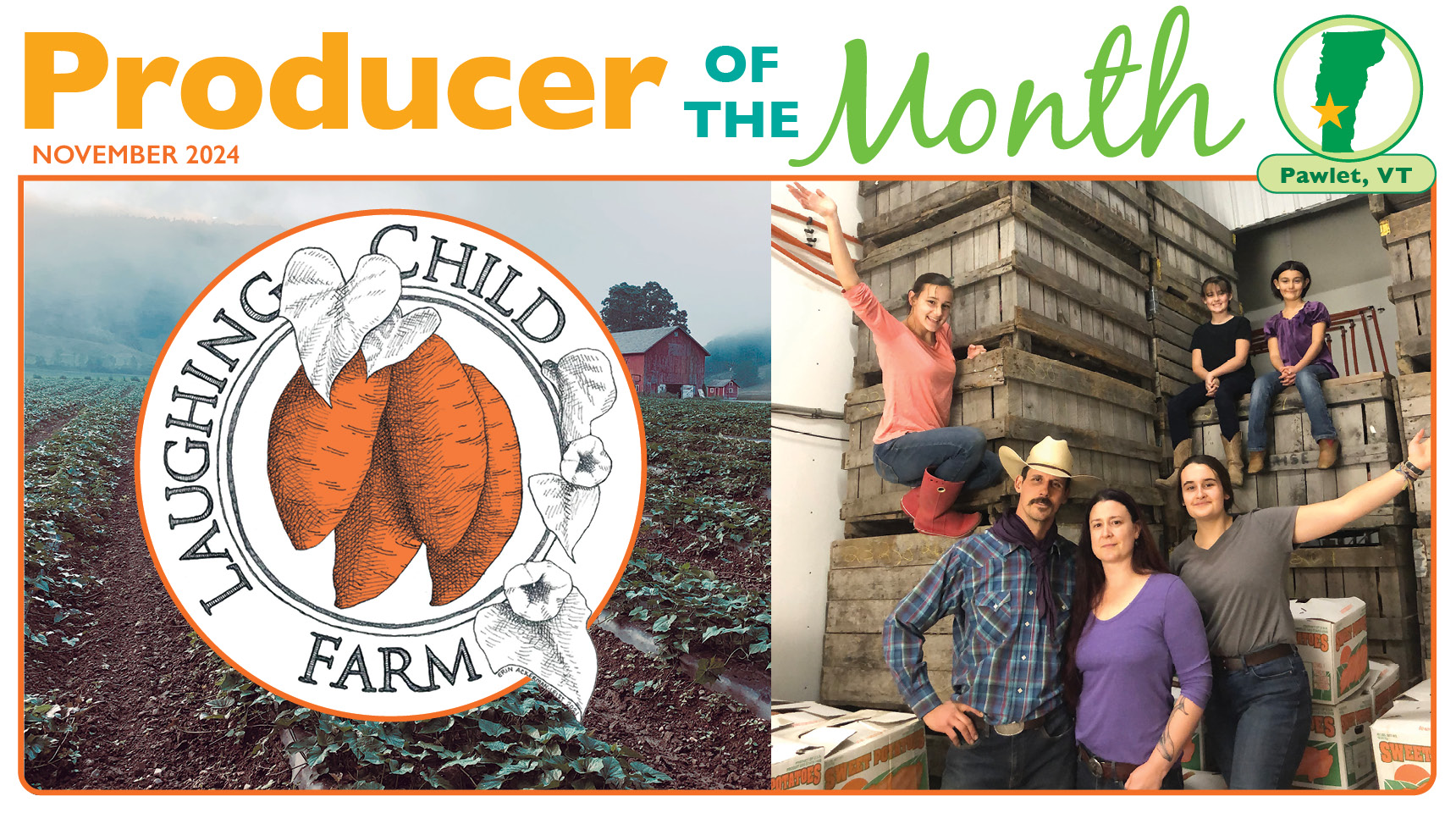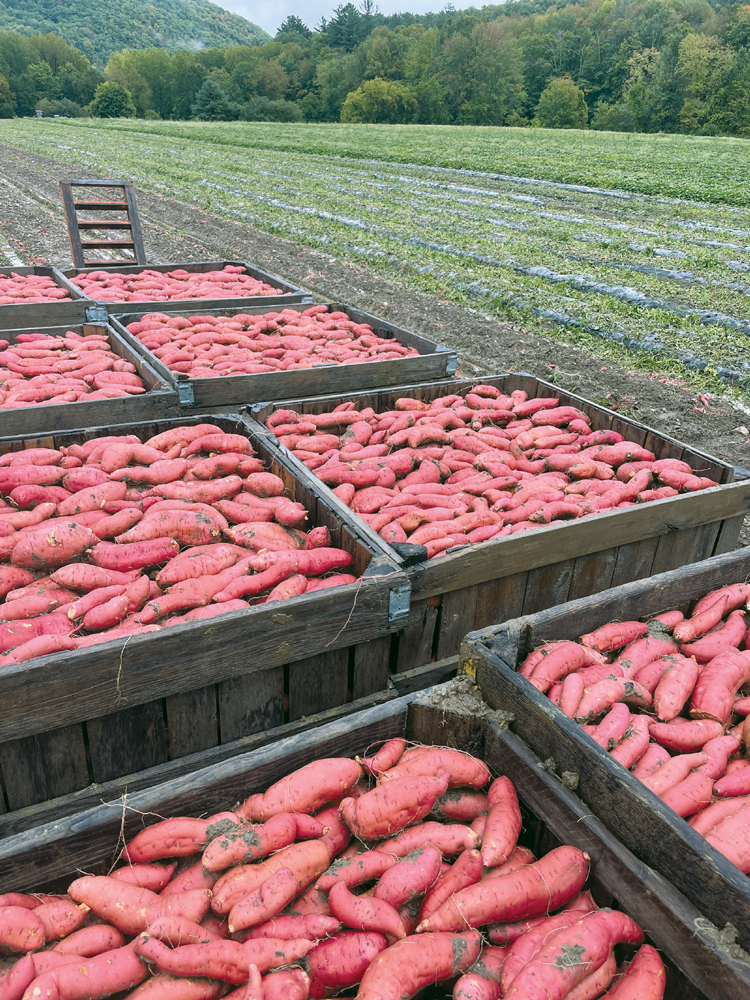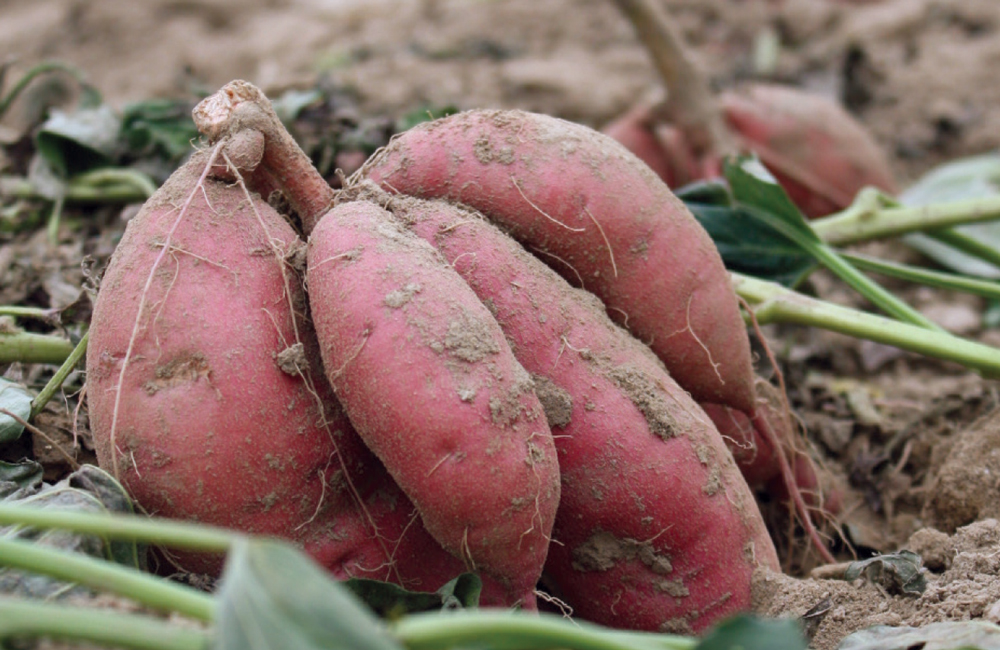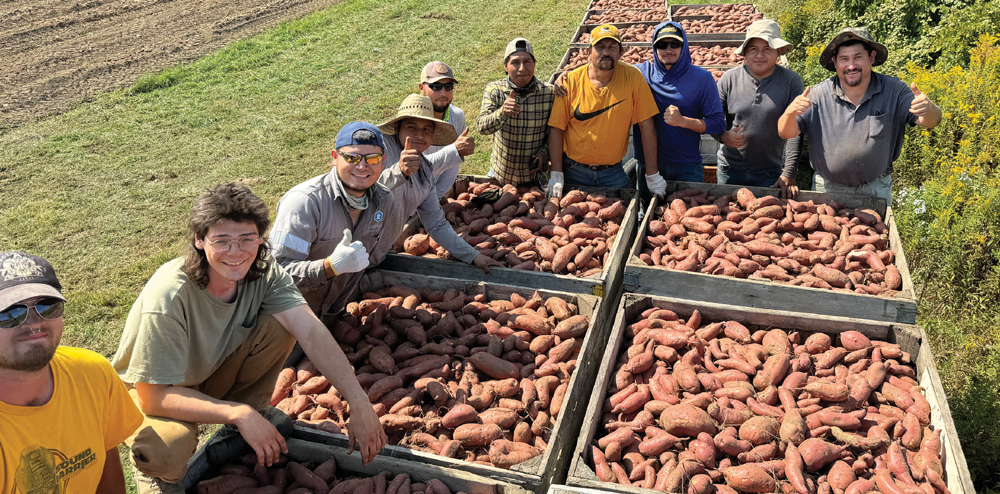Laughing Child Farm: Sweetest Sweet Potatoes

Every farm is unique, every farmer is an individual. But for the most part, as Tim Hughes-Muse of Laughing Child Farm jokes, there are usually a couple of things they have in common: they don’t work well with others, and they’re perhaps a bit unfit for society. In the case of Laughing Child Farm, there’s definitely some evidence to suggest this is true—Tim is almost always seen in photographs wearing a big white Stetson hat, while Brooke, his wife and co-owner-and-operator of the farm, has a big tattoo of a ram skull on her throat; the bags that hold their sweet potatoes feature an illustration by a motorcycle-riding writer-artist lady from the next hill over; and the farm’s theme song is “Snake Farm” by Ray Wylie Hubbard (chorus: Snake farm, it just sounds nasty/Snake farm, pretty much is). But it doesn’t take long to realize that underneath that tough stuff, there’s a deep and gentle heart and a wise, principled intelligence guiding the decisions Tim and Brooke have made over the years. And now, after over two decades of marriage and over a decade of growing their family, their business, and their crew, they come across as a couple of happy, smart, successful people who are putting a tremendous amount of positivity into the world, and growing the best sweet potatoes around.
A lot has changed in the world since 2017, which is the last time Laughing Child Farm was our featured Producer of the Month. But on their forty acres in Pawlet, a tiny town in Rutland County that bumps right up against the New York State border, the pandemic didn’t make a huge impact on their day-to-day lives, and they were spared from the destructive flooding that happened in our state these past two summers.

What has changed, however, is the soil, their expertise, and the size of their sweet potatoes. Since they started farming their land in 2012, their technique, systems, and the land itself have all gotten increasingly more optimized for their crop, and as a result, the sweet potatoes are growing bigger and faster. The turning point was 2019: that was the first year they accidentally grew lots of jumbo-size potatoes! When they started, it was a struggle to even get them to “fancy” size (fancy is agricultural-speak for smaller). What they’re aiming for is a healthy mix of fancy and Grade A, otherwise known as U.S. No. 1: a bit bigger than fancy, a bit smaller than jumbo, and overall pretty much perfect.
Tim came by this work honestly. He grew up on a beef farm in Maryland, and when he was just twelve years old, his dad gave him a full acre of his own to grow whatever he pleased. He decided on flowers, which he sold after school. But he didn’t plan on making this his career as an adult. He’d always been interested in science and philosophy, and studied at Green Mountain College. That’s where he met Brooke; they got married when she was twenty and he was twenty-one. After graduation, he needed to make money, and farming was what he knew how to do. And it just went from there.

One of the unusual things about Laughing Child is the fact that they grow one thing, and one thing only: sweet potatoes. When they were given the option to lease and purchase the land where Laughing Child now resides, they had originally wanted to grow strawberries, sweet peppers, and chickens. But being the seasoned growers that they are, they did a lot of planning and research beforehand, and the math just didn’t work out. In order to pay a mortgage with strawberries, Tim says you’d need to sell the entire crop within a two-week span. That’s a lot of pressure and a lot of risk. For sweet peppers, it’s a similar situation, although there’s a bit more of a window. Sweet potatoes, on the other hand, can be stored for a long time, which significantly lowers the pressure and the risk. They also discovered that the climate in Pawlet, as well as the soil quality and nutrient profile, are highly compatible with sweet potatoes. Plus, there weren’t really any other farms that were growing this crop at scale, so they knew they wouldn’t be cutting into anyone else’s market share. And, finally, sweet potatoes are just great! They’re so delicious, healthy, and versatile. You can put them in anything: breakfasts, lunches, dinners, snacks… Brooke and Tim even use them in smoothies to add nutrition and sweetness.
The farm has grown and expanded over the years, so that now Brooke and Tim don’t have to do everything themselves. In earlier years, they’d sometimes be up until two or three in the morning during the busy season and back at it again at 5 AM. Things really ramp up from October through December: the potatoes have all been harvested and then cured, which toughens the skin on the outside and keeps them moist on the inside. Then they’re washed and graded (categorized for size and quality), packed, and delivered. Before they had full-time help, it was just their four hands doing all the work. Now it’s easier.
Farming requires a lot, not only physically but also mentally and emotionally. And that’s not a bad thing when it’s serving a life that is in alignment with one’s values. Honestly, life on Laughing Child Farm seems pretty awesome. Tim talked about the engaging puzzle-like quality of improving so many interwoven systems season after season. Every year he learns so much from the fields, the weather, and the environment, it’s hard to wait until the next cycle to put all that new knowledge into practice. And they have an amazing crew—they’re not pulling all-nighters or delivering their own harvests anymore. Tim still likes hoeing, like he did when he was a kid: working his way up and down the rows, just one foot in front of the other, the pace and structure of it. Plus they all clearly have a really good sense of humor, working on a snake farm and all.

In 2020, they worked with Same Sun out of Rutland to install a solar panel field. Now they can use energy from the sun captured by these panels to power their farmstand and barn. The barn needs to be temperature-controlled to keep the potatoes hot and dry enough during the curing phase (90 degrees) and cool enough during storage—the sweet potatoes Laughing Child grow are so fresh and alive that they actually generate a significant amount of heat, and the storage area needs to be cooled down to 55 degrees in the wintertime!
Our Co-op has been Laughing Child Farm’s foundational customer since its early days. That means our cooperative is one of their main sources of revenue: your choice to buy produce from our store and to opt for Laughing Child sweet potatoes when you’re here has a pretty direct impact on some pretty great people. When you make that choice, you’re supporting a family that is making choices of their own to improve the land they’re on through responsible growing practices and investments in renewable energy; you’re also supporting our local food system, helping to keep our region strong and self-sustaining. It’s a big deal! Happily, it’s also an easy choice, because these sweet potatoes are SO DARN GOOD! And super nutritious, too.
By Ruth Garbus
About Producer of The Month

Shop Online

On Sale Now!

